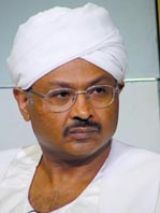PROFILE: Mubarak al-Fadil, pragmatic Sudanese politician
By Wasil Ali
July 15, 2007 (KHARTOUM) — Sudanese security services on Saturday arrested the Mubarak al-Fadil, chairman of the Umma Reform and Renewal opposition party, over allegations of planning sabotage actions in the country.
The Sudanese government alleges that Al-Fadil is the mastermind behind a sabotage plot to be carried out in Khartoum.

Al-Mahdi revealed that Libya is the one who notified Sudan of Al-Fadil’s contacts with them to get financial support for the sabotage attempt.
The arrest of Mubarak al-Fadil by Sudanese security services came as a surprise to most observers. Al-Fadil has withdrawn from the political scene for some time.
Analysts speaking to Sudan Tribune appeared skeptical of the announcement by the Sudanese government. Some have suggested that the accusations are politically motivated.
BACKGROUND
Al-Fadil was born in Sudan in 1950. He was the youngest of six siblings and the closest to his father Abdullah Al-Fadil Al-Mahdi. Al Fadil’s mother, Munira Abdel-Aziz Al-Gabani, was the Al-Mahdi’s second wife and is believed to be of Egyptian origin.
Al-Fadil received his primary education in Sudan before traveling to Lebanon to continue his high school education at Chouiefat school. He received his college degree from universities in UK and Germany majoring in political science.
Al-Fadil is also the brother in law of Ghazi Salah al-Deen, the Sudanese presidential adviser.
POLITICAL CAREER
Al-Fadil was a member of the Sudanese parliament representing the Umma party in the in the last democratically elected government in the years 1986-1989. He was appointed a minister of Industry, trade and Interior during these years.
Following the coup staged by the National Islamic Front led by Omar al-Bashir in 1989 al-Fadil made a dramatic escape in his own car through the desert to Libya in the early morning hours.
Al-Fadil has been instrumental in creating the National Democratic Alliance (NDA) which is an umbrella of northern opposition parties and Sudan People Liberation Movement (SPLM) working to topple the Sudanese regime at the time. He was appointed as the NDA’s secretary general.
Following the split between the Umma party and NDA Al-Fadil returned to Khartoum in 1999. In 2002 al-Fadil defected from the Umma Party led by his cousin and the former Sudanese Prime Minister Al-Sadeq Al-Mahdi. Al-Fadil was of the view that the Umma party should take part in the Sudanese government while al-Mahdi rejected any participation in a non-democratically elected government.
Al-Fadil and al-Mahdi exchanged bitter accusations with each other during the years 2002-2003. Al-Fadil created his own party calling it Umma Reform and Renewal. He was appointed as a presidential adviser for economic affairs in 2002. Several members of his newly created part were also appointed in various positions in the government.
BACK TO OPPOSITION RANKS?
Al-Fadil has often complained that he had no mandate in his new position and felt marginalized from the decision making process in the government.
The turning point came about when Al-Fadil received an invitation to visit the US as head of the Umma Reform and Renewal party. The invitation angered the Sudanese president who saw a pattern of Al-Fadil acting in his own capacity without consultation with him. Al-Fadil was sacked in a presidential decree in October 2004.
Al-Fadil has been critical of the Sudanese government particularly in dealing with the conflict in Darfur. His political stances have encouraged from the mainstream Umma Party to reconcile him with his cousin Al-Sadeq Al-Mahdi. In the last few months there appeared to have been a breakthrough in these attempts.
The wife of Al-Fadil, Sumaya Idris told Sudan Tribune that the Sudanese government ” is wary of Umma party reunification going underway”.
“BULLDOZER”
Al-Fadil has been named “the bulldozer” by many people to describe his determination and his strong organizational skills. He is given credit in bringing the NDA together despite the deep ideological differences between its members.
There is also an agreement among Sudanese figures that Al-Fadil is one of the most pragmatic politicians in Sudan. The note his incredible ability of building bridges with both ends of the political spectrum in Sudan and utilizing it to achieve his goals.
However Al-Fadil is accused by some Sudanese as a proxy for the US. He is widely believed to have provided the US with intelligence information that facilitated the bombing of Al-Shifa pharmaceutical factory in 1998.
Some reports also indicate that Al-Fadil accompanied the notorious Jinjaweed leader Musa Hilal to meet with the US Charge d’affaires in Khartoum. During the meeting, thought to have been videotaped, Hilal provided detailed information on Khartoum’s support of the Jinjaweed militias in Darfur.
FUTURE OF AL-FADIL
The Sudanese government said that it intends to prosecute Al-Fadil which means that he may face long prison term. However, according to some analysts it is highly unlikely that he will serve such a term. They suggested that Khartoum simply wants to restrict him politically to prevent political alliances that would jeopardize the National Congress Party (NCP) stakes in the forthcoming elections.
In the meanwhile the Sudanese government will have a tough time selling the story of the alleged sabotage attempt to a skeptical public.
(ST)
